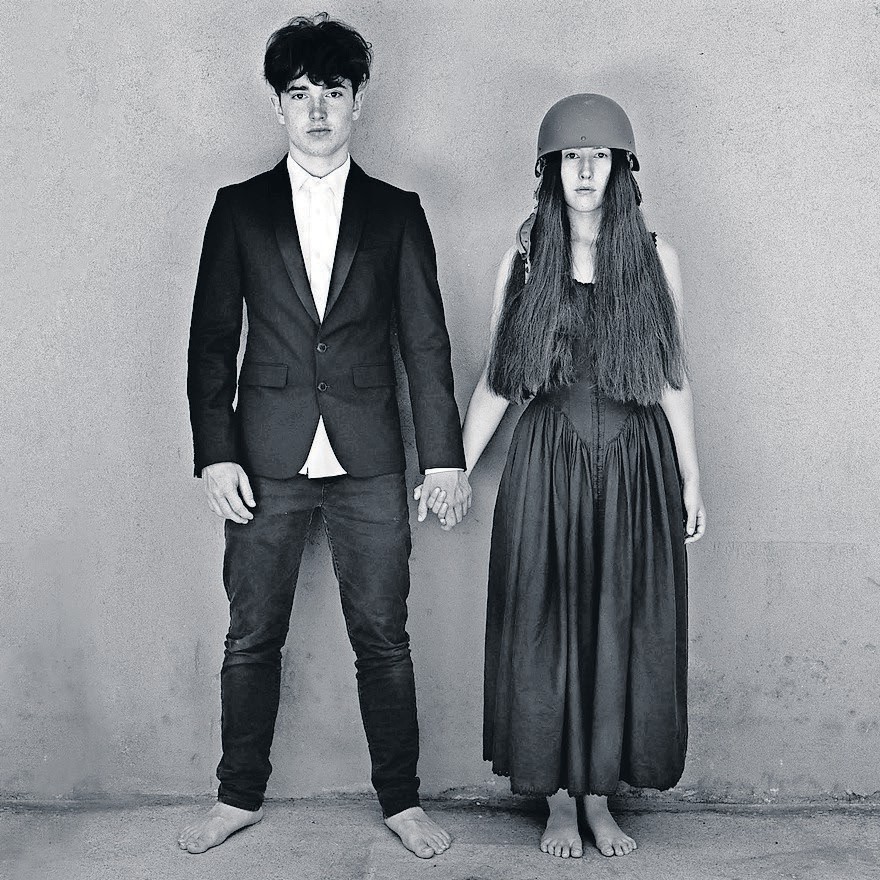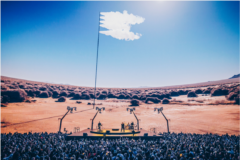U2 and the Rolling Stones have taught us that being the biggest band in the world is the most joyless of rituals. They record albums as excuses to tour, they embark on tours as excuses to transport massive steel structures from city to city and set world records for Largest Stage Ever. Sales and chart success aside, when bands reach this point they’re done. The problem’s less that they succumb to nostalgia, though they may, than how massive scale and routine professionalism suck the content from the music–suck the need for content from the music. U2 may not have recorded the same album five times since 2000, but they may as well have; by now U2 albums as individualities don’t matter. Of course their latter-day albums are bland, cursory collections of gargantuan arena-rock generalization. Could they really hit the road, fill the stadiums, and touch the souls of every living human in the audience with anything less?
We can make marginal distinctions, however, and their fourteenth album, Songs of Experience, clicks into place more boldly than Songs of Innocence did three years ago. Tempos are alert, riffs punchy, melodies sharp. Jacknife Lee and Ryan Tedder apply compression and electronic gloss to their signature ringing echo, covertly adapting classic U2 style to the contours of digital sound. They’ve thrown in a few genre experiments, daft as ever: “Love Is All We Have Left”, which opens the album, quavers over chilly keyboard atmosphere as Bono murmurs through a gurgly vocoder. Later, Kendrick Lamar declaims a preacherly interlude between “Get Out of Your Own Way” and “American Soul”; the latter deploys bluesy garage riffage whose distortion must be what gave Bono the confidence to bellow, “For refugees like you and me, a country to receive us/will you be our sanctuary, REFUJESUS!”
Daftness is customary on a U2 album–Bono’s howlers are funny! The question is whether minor variations on a formula make a difference. U2 albums have an odd way of flattening out stylistic particularities: deviations from a norm reinforce the norm when the band treats them as deviations. Lead single “You’re the Best Thing About Me” crackles with crunchy fuzz guitar and shrewdly integrated strings provide counterpoint, but it sounds like the usual soaringly hooky arena rock track. As with all their albums since 2000’s All That You Can’t Leave Behind, moderately harsh guitar textures softened by pealing arpeggios dominate, coated in reverb and production polish–behold once more their eternal chugging chime, gesturing at an ideal sonic essence vaguely reconstructed from what they sounded like in the ‘80s.
Songs of Experience boasts a few keepers: “Summer of Love,” a quiet stunner, builds gradually over a trebly lick and a marvelous Adam Clayton bassline; when the strings sweep in, guitars and violins reflect off each other to form a dazzling prism of aural light. On “Red Flag Day”, the Edge’s jaggedy percussive power chords and the thundering beat generate propulsion to match the sour tingle of Bono’s vocal. It’s too bad the lyrics fidget with garbled metaphors and spout incoherence about the Syrian refugee crisis. It’s also too bad the album’s second half gets stuck in pensive midtempo mode and never recovers; “The Little Things That Give You Away” instantiates a type of ponderous rumination we know to be cathartic only because the end is much, much louder than the beginning, with five empty minutes in between.
Fans will find plenty to savor on Songs of Experience–it’s their best since How to Dismantle an Atomic Bomb. But distinguishing between these albums misses the point. They call one song “Love Is Bigger Than Anything in Its Way,” a platitude that suits. This band knows what it means to be bigger than anything in its way. They’re so big specific albums don’t matter. Nothing specific they do matters. They’ve swept themselves up in their own bigness; it subsumes them.





